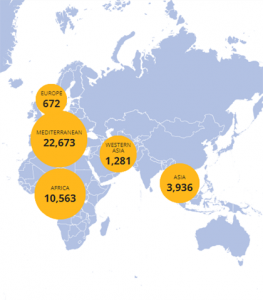Call for action to help families of ‘missing migrants’
Governments across the globe should urgently improve support for tens of thousands of migrant families who are desperately trying to find out what has happened to loved ones missing during migration journeys, a new report says.
The International Organisation for Migration’s (IOM) Global Migration Data Analysis Centre (GMDAC) has called for action on an issue that has seen almost 50,000 migrants disappear since 2014.
 The report says many families are forced to rely on smugglers and other informal networks to trace missing loved ones.
The report says many families are forced to rely on smugglers and other informal networks to trace missing loved ones.
It says that despite human rights obligations under international law, some governments are ignoring the perspectives of missing migrant families and communities in policy debates about safe migration, resulting in persistent exclusion and marginalization, which has increased during the COVID-19 pandemic.
It said that because of inadequate responses by state actors, families resorted to using informal networks, including other migrants, community-based associations and smugglers, in their searches.
The report says that “authorities often frame missing migrant cases as investigations into migrant smuggling operations: when families (or activists acting on their behalf) reported the disappearances of migrants to authorities, they were often pushed for information concerning the smugglers who organized their loved one’s journey, rather than about the disappearance itself”.
The GMDAC’s Missing Migrants Project compiled the report based on research with 76 families of missing migrants in Ethiopia, Zimbabwe, Spain and the United Kingdom.
Entitled “Families of Missing Migrants: Their Search for Answers and the Impacts of Loss – Lessons across four countries”, the report’s accompanying policy briefing proposes ten recommendations for authorities, international organizations and other actors to improve the response to cases of missing migrants and support for their families.
“The study aims to amplify the voices of people with loved ones missing on migration journeys, and to better understand their challenges,” said GMDAC Director Frank Laczko.
“Sharing these findings with the public is but a first step in improving the support mechanisms for migrants and the people they leave behind,” he said.
The report includes families’ testimonies that indicate “devastating psychological anguish”, as well as legal, financial and administrative impacts of the disappearance of their relatives.
A farmer in Ethiopia told the report’s authors his missing sons had been his hope for the future.
“They used to help me till and farm the land and now I am getting older and weaker and can’t work,” he said. “I rely on my relatives for agricultural labour but my farm is ploughed late and cannot produce much. My life is becoming hell. I cannot even pay the moneylender. My wife is already bedridden.”
The report highlights how inequalities shaped by factors such as gender, age, class, race, and migration status impede search efforts.
IOM’s recommendations include that States and relevant international actors establish specific roadmaps for managing cases of missing migrants and also implement safe and accessible ways for families to report their missing relatives.
The report and policy briefing are part of the project “Assessment of the needs of families searching for relatives lost in the Central and Western Mediterranean”, funded by the Swiss Federal Department of Foreign Affairs.
The Missing Migrants Project is an initiative of IOM aimed at documenting the disappearances and deaths of people in the process of migrating to an international destination.
A revamped Missing Migrants Project website now includes the project’s country reports and final report, as well as other resources to learn more about the experiences of families of missing migrants. There is also information on relevant NGOs and other actors that may be helpful to those searching for missing loved ones.
Read more here: https://missingmigrants.iom.int/












